1:24 AM 10/30/2022 - Intelligence failures before Jan. 6 warrant even more investigation | Russian agents may have hacked former British PM Liz Truss’s phone | Webs Of Influence And Revolving Doors - Who Monitors CT Group? - via sarawakreport.org
Russian agents may have hacked former British PM Liz Truss’s phone

Russian agents may have hacked former Prime Minister Liz Truss’s personal phone during her summer leadership challenge that led to her taking the role of prime minister, according to reports.
The agents, suspected of working at the direction of Russian President Vladimir Putin, may have gained access to top-secret negotiations with key international allies and personal messages between Truss and her future Chancellor of the Exchequer Kwasi Kwarteng.
A U.K. Government spokesperson told Fox News Digital that while the government does not comment on individual security arrangements, “The Government has robust systems in place to protect against cyber threats,” including “regular security briefings for ministers and advice on protecting their personal data.”
The government allegedly knew of the hack during the summer, but then-Prime Minister Boris Johnson and Cabinet Secretary Simon Case suppressed details about the hack, the Daily Mail reported.
Truss served as the Foreign Secretary prior to taking over as prime minister. She served as a primary point of contact for the U.K.’s response to the Russian invasion of Ukraine, famously blaming Putin directly for the emerging global energy and food crises.
 The agents are suspected of working for Russian President Vladimir PutinKremlin/UPI/Shutterstock
The agents are suspected of working for Russian President Vladimir PutinKremlin/UPI/ShutterstockRebekah Koffler, the president of Doctrine & Strategy Consulting and a former DIA intelligence officer, told Fox News Digital that it would be no surprise that Russia might target Truss – and no surprise that they would have succeeded.
“It’s a standard operating procedure for Russian intelligence operatives to try and intercept communications of prominent foreign leaders that are high-value targets for them,” Koffler said. “The goal is either to exfiltrate intelligence or to embarrass a foreign official by leaking hacked content, if the Russians find something juicy, in terms of personal data.”
Koffler mentioned previous instances in which Russia was able to flex its hacking capabilities, such as when Russians posted a recording of a phone call they intercepted between U.S. Ambassador to Ukraine Geoffrey Pyatt and Assistant Secretary of State Victoria Nuland in which they made disparaging comments about the European Union. She also claimed that Russians freely read President Barack Obama’s unclassified emails.
“If you are a prominent official or a business leader, your phone contains so much data — emails, pictures, voicemails — that can be of value to hostile intelligence services,” Koffler explained. “The Russians are highly skilled at hacking and are always on the hunt for valuable secrets or what they call “kompromat” – compromising information. Cyber hacking an enormous threat for government and business leaders, especially when they travel outside their home country.”
One such message to Kwarteng included criticism of Johnson, which the Government worried could turn into some form of blackmail.
Other messages may have included details about arms shipments to Ukraine.
A source with knowledge of the alleged incident told the Mail that the initial revelation caused “absolute pandemonium.”
“It is not a great look for the intelligence services if the Foreign Secretary’s phone can be so easily plundered for embarrassing personal messages by agents presumed to be working for Putin’s Russia,” the individual said. As much as a year’s worth of messages may have been downloaded from Truss’s phone.
She may have also been so worried about the breach that she was unable to sleep during the time and feared that new of the hack would undermine her campaign for party leader.
The U.S. Department of Defense deferred comment to the State Department, who did not respond by time of publication.
/cloudfront-us-east-2.images.arcpublishing.com/reuters/LF2VNLPLLJKLTJGMGZORJTFTUI.jpg)
Liz Truss delivers a speech on her last day in office as British Prime Minister, outside Number 10 Downing Street in London, Britain, October 25, 2022. REUTERS/Henry Nicholls
LONDON, Oct 29 (Reuters) - Former British Prime Minister Liz Truss's personal phone was hacked by suspected agents working for Russian President Vladimir Putin when she was foreign minister, the Daily Mail reported on Saturday.
Those agents gained access to "top-secret details" of negotiations with international allies in addition to private messages exchanged with Truss's close friend Kwasi Kwarteng, who later became finance minister, the report said.
The messages are believed to have included discussions with senior international foreign ministers about the war in Ukraine, including details about arms shipments, it added.
Up to a year's worth of messages were downloaded, the Mail said, citing unnamed sources.
A British government spokesperson declined to comment on "individuals' security arrangements".
"The Government has robust systems in place to protect against cyber threats. That includes regular security briefings for Ministers, and advice on protecting their personal data and mitigating cyber threats," the spokesperson added.
The hack was discovered during the Conservative Party leadership campaign that led to Truss becoming prime minister, the Mail reported.
Truss left office last week as prime minister and was succeeded by Rishi Sunak.
The Mail said the messages that fell into foreign hands included criticisms of Johnson made by Truss and Kwarteng, "leading to a potential risk of blackmail".
Reporting by Sachin Ravikumar Editing by Nick Zieminski
Our Standards: The Thomson Reuters Trust Principles.

Hovering behind the leadership bids, and once in office the policy units, of both Liz Truss and Boris Johnson has been the shadowy lobbying and PR conglomerate, CT Group, run by the Australian right wing political strategist, Sir Lynton Crosby (the knighthood was bestowed by a grateful Cameron after Crosby managed his 2015 election win).
The latest shenanigans within the Conservative party have highlighted troubling aspects as to how this outfit operates and how it appears to disguise apparent conflicts by operating at arms length from target politicians simply through swapping official roles and companies.
Examples appear to be the distancing of clients connected to the group that include former Tory leadership candidate Nadhim Zahawi and also Fathi Bashagha a Libyan rebel politician who is seeking to overthrow the elected government which has been recognised internationally and by the United Nations.
Both these individuals have featured in the recent re-packaging of CT Group’s founding former partner, Mark Fullbrook, who has operated as an independent consultancy over the past tumultuous months of Conservative government where both CT Group and Fullbrook have been at the helm of rival leadership campaigns.
During the earlier Brexit turmoil CT Group emerged as key backers of Boris Johnson having supported his previous mayoral campaigns funded by donors such as party treasurer Jonathan (now Lord) Marland and the billionaire Reuben brothers from Russia.
Fullbrook had claimed to have taken a sabbatical from his job at CT Group and worked for free with colleagues, including Isaac Levido and David Canzini, on Boris Johnson’s successful Conservative leadership campaign. Both Levido and then Canzini later joined the government as Downing Street advisors to Boris Johnson.
At the end of March this year Fullbrook then quietly left the CT Group partnership he had presided over since 2012, severing his directorships with a swathe of global subsidiaries of the firm.
This was shortly after the Department of Justice and FBI had started making enquiries into the group’s involvement in a Puerto Rico election where the election services of the firm had been allegedly offered as a bribe to the sitting governor as an incentive to block investigations into an offshore bank (a story broken by Sarawak Report). Fullbrook had been the point man on the contract.
By April Fullbrook had set up Fullbrook Strategies as a apparent rival to his old company. However, notably, his former partner Lynton Crosby was on the advisory board as was the Australian billionaire and Tory donor, Michael Hintze, known to be a close ally of Crosby.
In this capacity Fullbrook began to service the leadership campaign for the wealthy businessman MP Nadhim Zahawi, Secretary of State for Education and briefly Chancellor under Boris Johnson. According to reports, it was Fullbrook who advised Zahawi (the second richest member of the cabinet) on his brutal strategy to first take the Chancellorship following the resignation of Rishi Sunak (the richest) and then to almost immediately resign himself, precipitating Johnson from Downing Street (Zahawi has now declared himself a Johnson backer in the repeat contest).
All this period CT Group itself, and particularly Lynton Crosby, continued to act as close advisors to Boris Johnson as he strove to cling to office, raising concerns that the separation of these once close knit partners owed more to the desire to ride rival horses in the same race as the Boris government imploded than a genuine business split.
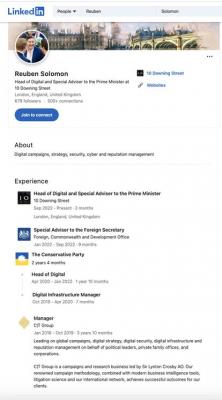
From PR lobbying to party posts the CT Group influence model
That concern strengthened when Zahawi crashed from the race to be replaced as a front-runner by Liz Truss, who immediately inherited Fullbrook as her campaign strategist, together with David Canzini and another CT Group veteran Reuben Solomon (who had secretly run a mysteriously funded pro-Brexit campaign on social media during the 2016 referendum whilst working for CT Group, before moving to act as the Conservative party’s online media strategist for the next two years).
Following her victory all thee of these ex-CT Group personnel acquired policy posts in Downing Street, along with other Fullbrook Strategy employees who included the wife of Jake Berry, Truss’ newly appointed Conservative party chairman (whom she has knighted). Fullbrook became the new Downing Street Chief of Staff.
By this means, observers have noted, personnel until recently associated CT Group maintained an inner seat in government despite the change of prime minister. Observers also note that Truss was herself supported by Boris Johnson to be his successor. Former close ally Dominic Cummings indicated at the time that Johnson did so on the grounds that she was an insane ideologue – “human hand grenade”/ “mad as a box of snakes” – who would soon create havoc and thereby open a path for his return.
Cummings publicly suggested this was the plan before Truss indeed proved herself to be an incompetent ideologue, created havoc and opened a path for Johnson’s’s return. Mr Cummings tweeted July 20th:
“Why is the [trolley emoji – meaning Boris Johnson ] supporting the supporting the human hand grenade [ Liz Truss ]?
“Cos [trolley emoji] knows she’s mad & thinks she’ll blow & he can make a comeback… He knows she is mad as a box of snakes and is thinking ‘there is a chance she blows, there’s another contest and I can return’.
Continuing to support Johnson, should he be successful, are Lynton Crosby and major donors such as the disgraced Lord Cruddas (whom Johnson ennobled in the face of opposition by the House of Lords Appointment Committee) who has been whipping up support for a ‘Bring Back Boris’ campaign amongst party members since the day he was forced out.
The Daily Mail editor, Paul Dacre, heavily campaigned together with other pro-Johnson media to promote Truss as a credible candidate during the leadership election, before the paper rounded on her mistakes. He is known to be on Boris’s planned resignation honours list, as revealed by a CT Group advisory paper to the former prime minister, again revealed by Sarawak Report.
Why is it so important for CT Group to back the winning candidate in a British leadership election, one might ask, given that the vast majority of its earnings come not from political clients but from a swathe of corporate interest, foreign powers and wealthy individuals? Crosby in fact funded Boris’s election campaign and not the other way around.
The answer might appear to be that CT Group’s value as a lobbying, PR strategist and political influencer on behalf of its major clients comes, above all, from that inside seat in government where former CT Group employees ensconce themselves as advisors at the side of the politicians they helped campaign for.
There are few rules against this revolving door for lobby group personnel and likewise few rules of disclosure. Hence, when it emerged in the past days that Mark Fullbrook retains a 10% shareholding in CT Group it was announced that what rules there are had been satisfied since these undisclosed interests had been put in a managed ‘trust’.
Thus, it is claimed, no conflict of interest could be said to exist between Fullbrook’s role as Chief of Staff to Liz Truss and his shares in a PR and lobbying group. Really?
Johnson’s own Conservative chairman, Ben Elliot, maintained a similar ‘distancing’ between his own PR company and political role of course. It did not discourage the Venezuelan fugitive billionaire Julio Herrera Velutini (now facing charges in the United States) from both donating to the Conservatives and hiring Elliot’s PR company to promote his business.
Neither does CT Group have to disclose its own clients under present rules, despite the fact that endless recent personnel are floating around the corridors of power. Nonetheless, it is established that those clients include members of the tobacco, gambling, alcohol, foods, fossil fuel and mining industries.
When CT Group was commissioned secretly by Boris Johnson to produce a plan to stuff the House of Lords with newly ennobled compliant peers, one piece of legislation that was envisaged in its ‘Project Homer’ report was the relaxing of tobacco regulations.
Sarawak Report can also disclose that Nadhim Zahawi’s connection with CT Group pre-dates his hiring of Mark Fullbrook during the leadership contest. The Iraqi born businessman is of Kurdish background and achieved a lucrative role as chief strategy officer to the oil company Gulf Keystone which has obtained major concessions in the area controlled by the Kurdistan Regional Government under the governing Kurdish Democratic Party (KDP).
It has emerged that a leading member of the KDP was paid kickbacks by Gulf Keystone to seal the deal, nonetheless a London court found in favour of the company against a rival claimant in a bitterly fought case in 2013. CT Group were hired as strategists by the winning side according to information received by Sarawak Report.
Meanwhile registered payments to Zahawi include those by the Government of Bahrain, the Kurdistan Regional Government, the Shura Council of the Kingdom of Saudi Arabia and the Kurdistan Regional Parliament of Iraq, to cover the costs of his visits to these regions.
Likewise, Fullbrook’s other headline client since setting up his own consultancy in March, the Libyan rebel politician Fathi Bashagha as first published by the Guardian.
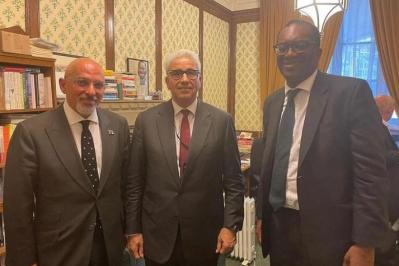
Meeting organised by Fullbrook Strategies in June between the Libyan political warlord Fathi Bashagha (centre) in and Tory ministers Nadhim Zahawi (left) and Kwasi Kwarteng
Sunday Times has now revealed that Fullbrook had by June already organised a tour for this foreign political figure in the UK to lobby government decision makers as part of his campaign to entice western powers away from their support of the present leadership of that country. Bashagha is supported by Russia and the mercenary Wagner Group as it seeks the military overthrow of the Government of National Unity (GNU) in Tripoli, established last year through a UN-led process.
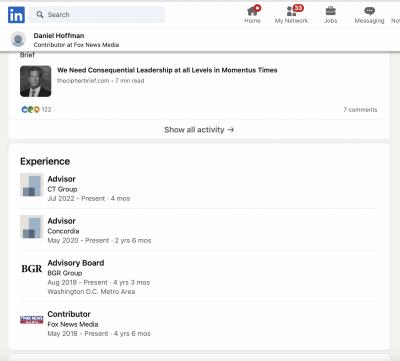
The Connection between the Libyan political warlord client and Fullbrook Strategies appears to have links to CT Group, Fullbrook’s only too recent partner in lobbying
The ministers who agreed to see Bashagha in the UK, according to a photograph placed on Bashagha’s website record of the visit, were none other than then Business Secretary Kwasi Kwarteng and Nadhim Zahawi.
It is therefore worth an explanation as to how exactly Mark Fullbrook’s company came to represent Bashagha so swiftly after forming in March, given that Sarawak Report has yet again traced an interesting connection to CT Group.
Thanks to the tighter reporting rules that exist for foreign lobbyists in the United States (under the Foreign Agents Registration Act) it is a matter of record that Bashagha’s longstanding representatives in the United States are the Washing based lobby group BGR.
The individual who has managed Bashagha’s campaign, according to several reports, including promoting a positive image in the Washington Times, is BGR’s Advisory Board member Dan Hoffman.
Hoffman is an ex-CIA agent who worked in Libya and appears as a contributor on Fox News. Just last July he also joined CT Group as an advisor, leaving a valid question as to why it was the ostensibly independent Fullbrook Strategies who hosted this hot potato Libyan contact in the UK and not CT Group itself?
It leaves further valid questions as to whether sufficient disclosure and transparency rules currently exist to flush out continuing networks and ties between major corporate lobbying outfits and their former operatives as they move in and out of Downing Street influencing policy formation by the political appointees they helped put into office through campaigns for which the funding has not always been completely clear.

Published: 17:41 BST, 29 October 2022 | Updated: 22:00 BST, 29 October 2022
Liz Truss's personal mobile phone was hacked by agents suspected of working for the Kremlin, The Mail on Sunday can reveal.
The cyber-spies are believed to have gained access to top-secret exchanges with key international partners as well as private conversations with her leading political ally, Kwasi Kwarteng.
One source said that the phone was so heavily compromised that it has now been placed in a locked safe inside a secure Government location.
Liz Truss's personal phone - including private messages she exchanged with Kwasi Kwarteng - was hacked by agents suspected of working for Russian President Vladimir Putin
The former Prime Minister's phone was reportedly compromised while Ms Truss was Foreign Secretary
The hack was discovered during the summer’s Tory leadership campaign, when Ms Truss was Foreign Secretary, but the details were suppressed by Boris Johnson, who was Prime Minister at the time, and the Cabinet Secretary, Simon Case.
It is understood that messages which fell into foreign hands included criticisms Ms Truss and her future Chancellor Mr Kwarteng made of Mr Johnson, leading to the potential risk of blackmail. Sources said that up to a year’s worth of messages were downloaded.
They are also believed to have included highly sensitive discussions with senior international foreign ministers about the war in Ukraine, including detailed discussions about arms shipments.
The astonishing incident, disclosed by security sources, solves the mystery of why Ms Truss was forced to change the mobile number she had used for over a decade shortly before becoming Prime Minister. The move caused anxiety among Cabinet Ministers and advisers who were suddenly unable to contact her.
It is understood that messages which fell into foreign hands included criticisms Ms Truss and her future Chancellor Mr Kwarteng made of Mr Johnson, leading to the potential risk of blackmail. Sources said that up to a year’s worth of messages were downloaded
A source with knowledge of the incident said yesterday that the security breach ‘caused absolute pandemonium – Boris was told immediately, and it was agreed with the Cabinet Secretary that there should be a total news blackout.
‘It is not a great look for the intelligence services if the Foreign Secretary’s phone can be so easily plundered for embarrassing personal messages by agents presumed to be working for Vladimir Putin’s Russia.’
Allies of Ms Truss said she was worried that if news of the hack leaked, it could derail her chance of claiming the Premiership, adding that she ‘had trouble sleeping’ until Mr Case imposed a news blackout.
A source with knowledge of the incident said yesterday that the security breach ‘caused absolute pandemonium – Boris was told immediately, and it was agreed with the Cabinet Secretary that there should be a total news blackout
Former Conservative Party leader and leading Russia critic Iain Duncan Smith said: ‘This is what we’re up against. Russia does this all the time. This is their sole purpose – their way to get back at us. We are all far too casual about our phones in general. Ministers should be much more careful and should not be using their personal phones for anything. I assume my private phone is being hacked.’
Shadow Home Secretary Yvette Cooper said: ‘This is extremely serious – it shows the severity of the threats from countries that would do us harm and why cyber-security needs to be taken so seriously by everyone in Government. We need to know that the Government recognises the gravity of this.’
A Government spokesman said last night: ‘We do not comment on individuals’ security arrangements. The Government has robust systems in place to protect against cyber threats. That includes regular security briefings for Ministers, and advice on protecting their personal data.’
Former Conservative Party leader and leading Russia critic Iain Duncan Smith said: ‘This is what we’re up against. Russia does this all the time'
It is believed agents, suspected to have been working for Russian President Vladimir Putin, gained access to top-secret details of negotiations with key international allies
Shadow Home Secretary Yvette Cooper said: ‘This is extremely serious – it shows the severity of the threats from countries that would do us harm and why cyber-security needs to be taken so seriously by everyone in Government'
Security expert Professor Antony Glees said he was ‘gobsmacked’ by The Mail on Sunday’s revelations, adding: ‘What has happened here is absolutely appalling and is indicative of a Government that was extremely lax when it came to matters of national security.
‘We have Ministers using their private phones to conduct Government business over WhatsApp and their personal email, and this has to stop immediately. It is totally irresponsible. It is absolutely terrifying.
‘What is doubly horrifying is Boris Johnson knew this had happened but chose not to communicate it. And I fear that Liz Truss may not be alone in having her phone compromised.
‘The obvious suspects are Russia, China, North Korea and Iran who would have huge interest in knowing what the Foreign Secretary is communicating. The number one suspect, however, would be Russia.’
The security services have grown increasingly concerned about the threat posed by hackers working for hostile countries with mobile phones regarded as the ‘soft underbelly’ of the modern state.
An Israeli system called Pegasus, which gains access to phones without the owner knowing, was allegedly used by Saudi Crown Prince Mohammed bin Salman to hack Amazon founder Jeff Bezos. The spyware can be launched on phones with a text message, which does not even have to be opened, just received. It then runs secretly in the background, gaining access to everything on the device and tracking its movements.
Former senior military intelligence officer Philip Ingram said: ‘Ms Truss’s phone will be in a secure Government location, which means a secure cage where the device can be forensically examined by experts but without the hackers knowing.’
Another security source said: ‘It takes a while to track who is behind attacks like these, but Russia tends to top the list.’
An Israeli system called Pegasus, which gains access to phones without the owner knowing, was allegedly used by Saudi Crown Prince Mohammed bin Salman to hack Amazon founder Jeff Bezos
Ms Truss took an uncompromising approach to Putin during her time as Foreign Secretary and Prime Minister while the UK has been one of the strongest supporters of Ukraine
Ms Truss took an uncompromising approach to Putin during her time as Foreign Secretary and Prime Minister while the UK has been one of the strongest supporters of Ukraine.
The Mail on Sunday also reveals today that during the final days of her Premiership, Ms Truss became fixated by the weather forecast in case Russia deployed a nuclear device in or near Ukraine – as she was concerned about a possible radioactive cloud heading for the UK. ‘Liz was obsessed with the prevailing wind,’ said a source.
The Mail on Sunday revealed earlier this month that Ms Truss’s mobile phone number – the one that can now be revealed to have been hacked – was for sale on the internet, along with those of 25 Cabinet Ministers, for just £6.49.
Russia’s embassy in London was approached for comment.
The post Liz Truss’s personal phone was hacked by Putin’s spies for top secret details of negotiations with allies trib.al/P6kYhk9 first appeared on Brooklyn NY.
The post Now Ukraine’s military chief claims Vladimir Putin is using THREE body doubles trib.al/7fWyUSn first appeared on Brooklyn NY.
The UK’s Royal Navy has ordered an investigation into allegations of sexual abuse, bullying and harassment against female officers.
The claims include the creation of a list detailing the order in which female crew would be assaulted in a catastrophic event.
Admiral Sir Ben Key has stated anyone found culpable of the abuse will be held accountable.
A sudden and surprising spike in European exports of washing machines, refrigerators and even electric breast pumps to Russia’s neighbors is raising concerns among officials the trade boom may be helping Vladimir Putin’s war machine in Ukraine.
Armenia imported more washing machines from the European Union during the first eight months of the year than the past two years combined, according to data compiled by Bloomberg from the EU’s Eurostat database. Kazakhstan imported $21.4 million worth of European refrigerators through August, more than triple the amount for the same period last year.
Kazakh government data meantime show a jump in refrigerators, washing machines and electric breast pumps being shipped into Russia.
[time-brightcove not-tgx=”true”]
Some trade via Eurasian states into Russia may be opportunistic businesses making up for shortfalls of imports from elsewhere, or for Russian companies to break up the appliances and use components and semiconductors in civilian manufacturing.
But European officials familiar with the figures say they worry at least some of the goods and their components may be finding their way into military use, and are closely tracking the rise in exports to countries on Russia’s periphery.
Officials in Europe have already said publicly they have seen parts from refrigerators and washing machines showing up in Russian military equipment such as tanks since its invasion of Ukraine. People familiar with the assessments said it was quite possible that components and microchips from other household goods were being used for military purposes, too, even if mostly in relatively low-grade equipment.
The trade data show for example that EU exports of electric breast pumps to Armenia nearly tripled in the first half of 2022 versus the prior year, despite a 4.3% drop in the Armenian birth rate. Likewise, Kazakhstan’s demand for breast pumps from the EU soared 633% in the first half of 2022 even though the national birth rate fell 8.4% during the same period.
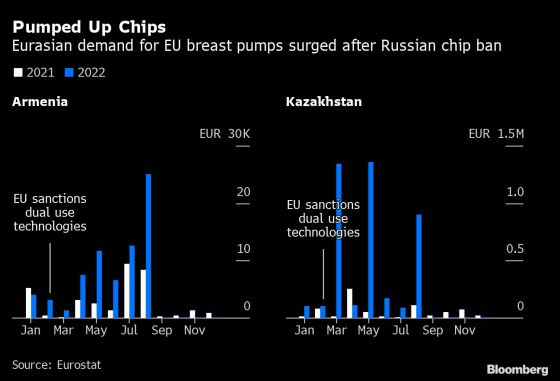
Putin’s war has seen Russia hit by sanctions on almost every sector of its economy, depriving it of imports including chips and other components it has long relied on for basic military equipment like radios and guns through to more sophisticated weapons including missile systems, fighter jets and submarines.
Authorities in Moscow stopped publishing trade figures after the invasion of Ukraine. Still, Russian demand for electric breast pumps from Kazakhstan more than doubled during the first eight months of the year versus all of 2021, according to Kazakhstan government data. The country also shipped $7.5 million worth of washing machines to Russia so far in 2022 — versus nearly zero the previous two years. Its exports of refrigerators to Russia have surged ten-fold versus the prior year.
“Even highly sophisticated Russian weapons systems are often built with run of the mill microelectronic components found in a range of commercial goods,” said James Byrne, director of Open Source Intelligence and Analysis Research at the Royal United Services Institute, a UK think tank. “It’s entirely possible that Russia’s military industrial complex is importing commercial off-the shelf goods to cannibalize for parts.”

Assessing the final destination and the use for the household goods is complicated. Armenia, Kazakhstan and Russia are all in the Eurasian Economic Union, which means there are no customs borders between them. European companies may not want to ship directly to Russia even if their products are not sanctioned, given the optics of being seen to do business with the country right now. They also may not be aware their goods are being sent onto Russia.
European officials say targeting trade in household appliances is difficult, as those items and their so-called sub-threshold components are often not sanctioned. That’s even as the EU has recently introduced new powers that allow it to sanction entities outside the bloc if they help European companies evade its restrictive measures.
Kazakhstan has vowed to not help Russia circumvent sanctions and there is no evidence the government is aiding Moscow to do so. Officials in both Armenia and Kazakhstan did not immediately respond to requests for comment.

European Commission President Ursula von der Leyen said last month the Russian military was using chips from dishwashers and refrigerators in its military hardware because it was running out of semiconductors. The Biden administration made a similar claim earlier this year, citing reports of parts that had been found in captured Russian tanks in Ukraine.
It isn’t clear exactly which components might be salvaged from household goods, although they generally all contain microchips. And without workarounds for foreign parts, Russia could find its ability hindered to check Ukrainian military advances on the ground, shaping the course and outcome of the war.
Read more: Ukraine Has Been Using Elon Musk’s Satellites And Russia Is Not Happy About It
European Commission spokeswoman Miriam Garcia Ferrer said the bloc was watching trade flows to identify where sanctions against Russia might be skirted. The commission also monitors “the items used by the Russian army in Ukraine based on forensic analysis of the debris of the remnants of destroyed Russian weapons,” she said.
She added low key components from washing machines or refrigerators are commercially available in many countries and regions and where the EU can identify items that are being used in Russian weapons it considers extending trade restrictions to them. For example a number of electronic components were sanctioned under the latest measures adopted earlier this month, Garcia Ferrer said.
After more than eight months of high-intensity warfare, Russia has sustained substantial equipment losses. US and European officials also say Moscow has run down its stockpiles of key weapons systems, such as high-precision missiles. Ukraine, by contrast, continues to draw on supplies of modern arms from its allies that, together with other advantages such as a ready supply of motivated recruits, has transformed the balance of forces on the battlefield.
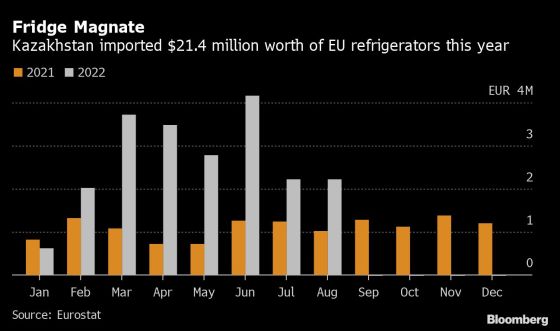
Bloomberg News reported earlier in October that Russia had tried for years to reduce its reliance on imports for a vast array of its military equipment — and an internal review in 2021 found it was falling short on almost every metric.
Read more: Ukraine Wants to Use Russian Assets to Rebuild. Experts Think It’s Risky
The US has pushed since the war broke out to cut off Russia’s supplies of semiconductors. “One of the things I’ve been able to do, and I make no bones about it, because of — with Russia’s activities, we have curtailed their ability to access some of this stuff,” President Joe Biden said on Thursday.
“They’re not able to rebuild those devastating weapon systems to take out those civilians in Ukraine as well,” he said. “Not a joke. It makes a big difference. These things matter, and they matter a great deal.”
Other countries that Russia regards as partners, such as China, have largely remained reluctant to supply it with semiconductors and key components even if they have not signed up to the sanctions imposed by the US, Europe and others.
Still, Russia had long experience in evading sanctions to supply its military during the Soviet era, through smuggling and espionage.
An August study of 27 advanced Russian weapons systems by RUSI found 450 unique foreign made components, a majority of which were manufactured in the US, and most of the rest in Europe and other nations that have imposed sanctions on Russia.
“Common components used in weapons platforms such as microprocessors, analog-to-digital converters, field-programmable gate arrays and micro controllers can also be found in a wide range of commercial goods such as televisions, cars, computers and cameras,” said Byrne, one of the authors of the RUSI report.
At the same time, a global semiconductor shortage “has reportedly caused many firms struggling with their semiconductor supply chain to cannibalize goods for their microelectronics.”
One European official noted that Russian troops were also systematically seizing and looting household appliances in Ukraine. The theft has been widely documented, but it isn’t clear how much has been taken for state use or personal use.
–With assistance from Sara Khojoyan, Jorge Valero, Nariman Gizitdinov and Akayla Gardner.
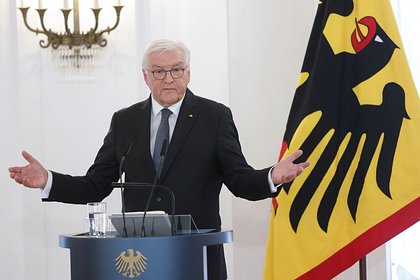
 image/jpeg 630_360_1659092121-788.jpg
image/jpeg 630_360_1659092121-788.jpg image/jpeg 630_360_1628691424-188.jpg
image/jpeg 630_360_1628691424-188.jpg image/jpeg 630_360_1663073593-349.jpg
image/jpeg 630_360_1663073593-349.jpg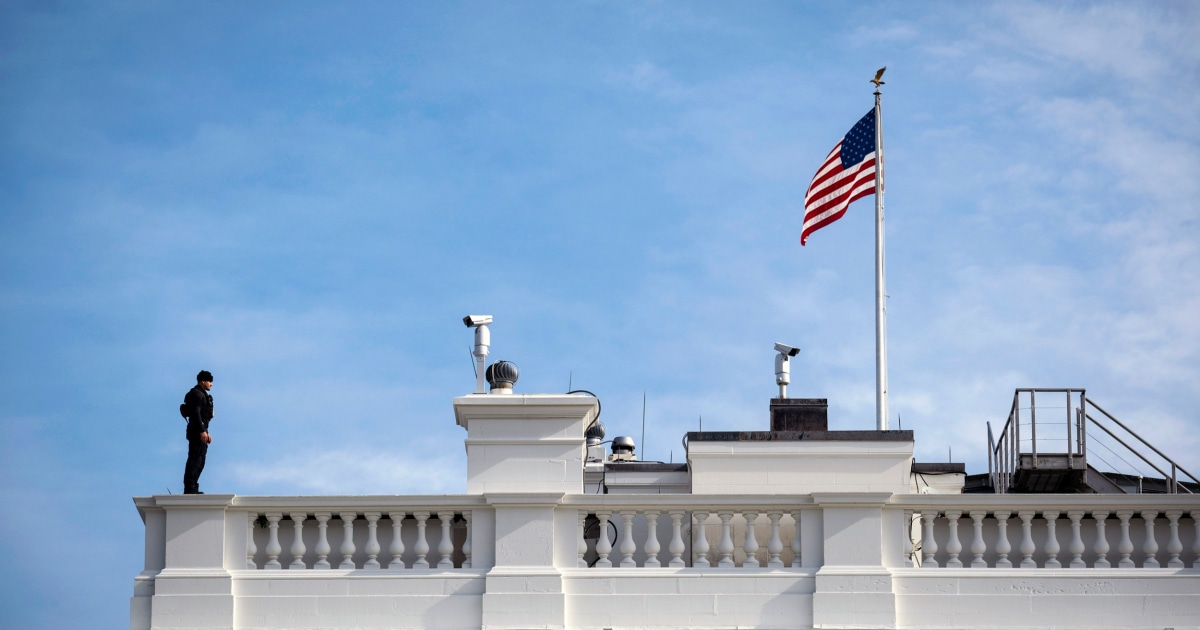
Days after the Jan. 6, 2021, assault on the U.S. Capitol, Steven D’Antuono, the head of the FBI’s Washington field office, said the FBI had no intelligence that suggested there would be anything that day but a lawful pro-Trump rally. Six months later, FBI Director Christopher Wray reiterated the claim when he told Congress that the agency he leads had had no specific “intelligence indicating that hundreds and hundreds of people were going to breach the Capitol complex.”
Did our law enforcement and intelligence agencies fumble the ball? Or was their failure more akin to intentional grounding?
But at Thursday’s hearing of the House Jan. 6 committee, Rep. Adam Schiff, D-Calif., touted “evidence that President Trump was aware of the risk of violence” and that “the FBI, U.S. Capitol Police, Metropolitan Police and other agencies all gathered and disseminated intelligence suggesting the possibility of violence at the Capitol prior to the riot.”
The Biden administration should be demanding answers. Did the leaders of our nation’s law enforcement and intelligence agencies fumble the ball that day? Or was their failure to prevent violence more akin to intentional grounding? Without substantive answers from agency leaders many of us will be left to conclude that there was a willful blindness to the signs that were staring them in the face. Was there institutional sympathy for the rioters’ cause? Were there orders from higher-ups to downplay the available intelligence? Do existing guidelines and laws constrain robust collection and investigation of domestic terror threats? If the premier agencies in federal law enforcement are to maintain credibility, they must be transparent with the public they depend upon and protect.
The FBI is the nation’s primary counterterrorism agency, and Schiff said Thursday that “days before Jan. 6, the president's senior advisers at the Department of Justice and FBI, for example, received an intelligence summary that included material indicating that certain people traveling to Washington were making plans to attack the Capitol. This summary noted online calls to occupy federal buildings, rhetoric about invading the Capitol building and plans to arm themselves and to engage in political violence at the event.”
The Department of Homeland Security is responsible for approving and disseminating critical intelligence to state and local law enforcement. But according to a March 4 report from the DHS inspector general, DHS’s Office of Intelligence and Analysis “identified specific threat information related to the events on Jan. 6, 2021, but did not issue any intelligence products about these threats until Jan. 8, 2021." That report also found that "the Field Operations Division (FOD) considered issuing intelligence products on at least three occasions prior to Jan. 6, 2021, but FOD did not disseminate any such products ultimately. It is unclear why FOD failed to disseminate these products."
Despite what they knew, neither the FBI nor the DHS prepared a disseminable threat assessment for the January Electoral Collage vote ratification or for the rally on the Ellipse.
As for the agency whose paramount mission is to protect the president and vice president of the United States, Schiff said, the committee has obtained “nearly 1 million emails, recordings and other electronic records from the Secret Service.” He said that “As early as Dec. 26, Secret Service officials were sharing one tipster’s warnings about extremist groups coming to the Capitol with murderous plans. ‘They think they will have a large enough group to march into D.C. armed and will outnumber the police so they can’t be stopped,’ the tip read. ‘Their plan is to literally kill people,’ the tipster wrote. ‘Please, please take this tip seriously and investigate further.’”
Previous reporting revealed the Secret Service learned on Parler of a threat against Speaker of the House Nancy Pelosi on Jan. 4 but did not let the Capitol Police know about it until 5:55 p.m. on Jan. 6, when police officers had already been fighting the rioters for hours and some rioters had posted photos from inside Pelosi’s office.
Then there’s the Defense Department, the agency responsible for authorizing deployment of the District of Columbia National Guard. According to testimony to the committee from Gen. Mark Milley, chairman of the Joint Chiefs of Staff, there were calls among the top brass to discuss planning for Jan. 6, and Thursday, Schiff referred to a call with President Trump's White House National Security staff in early January 2021 wherein: “Deputy Secretary of Defense David Norquist warned about the potential that the Capitol would be the target of the attack."
It's important that the committee provide us a play-by-play analysis of what went wrong across these agencies.
But when Jan. 6 arrived, our law enforcement and intelligence agencies and our military operated like a football team that had ignored the scouting report on its opponent. The FBI, Homeland Security, Secret Service and Defense Department seemed outnumbered and unprepared on Jan. 6. Before its time runs out, it’s important that the committee provide us a play-by-play analysis of what went wrong across these agencies and offer solid recommendations on how to avoid a repeat of that colossal failure.
There’s a difference between losing by clumsily dropping the ball and willfully throwing the game. If the government failure was a fumble caused by outdated policies, inadequate laws and authorities, or insufficient collection and dissemination, then those weaknesses need to get fixed. But if this was a refusal to play to win, that is, a decision to let the opponent have its way, then we’ll need some new players in key positions.



Comments
Post a Comment